#i don't know thus far the hypothesis that makes the most sense
Text
maybe the most surefire way to not be an arse about shipping is to have your first-ever serious OTP be a rarepair
#blitzarachnia til i die babey but never once have i gone round telling other people they should be writing about the spider and the jet-tank#we got one piece of fanart that someone bothered to make once a month on the deviantart group and we were GRATEFUL for it#like having stuff for your rarepairs is an insane hit of dopamine but like#after receiving that hit why would your response be to go around and trying to shake other people down for more#it's just... rude? and unkind?#i don't know thus far the hypothesis that makes the most sense#is that people who do that shit are people who started out in whichever fandom with a popular ship#where there was loads of content#and then they come to somewhere else where they ship something not so popular and they want the old setup back#and if lots of content used to be provided then i guess you'd expect that treatment again?#but it is a bit karen-ish like#someone's gotta make that stuff#for FREE#why should it cater to you if the person making it doesnt know you from adam#fandom
45 notes
·
View notes
Text
MILGRAM theory time: Haruka!
This isn't going to go super in depth (famous last words) but there's a few heavily debated parts of Haruka's MV I want to share my findings/thoughts on because I think this is my new special interest and during my quest to get best boy's song to 1 million views I have been looking over his first MV with a fine tooth comb so to speak.
Disclaimer: As the Jackalope said in the "This is the MILGRAM" trailer, we don't necessarily know everyone's crime from just the first video, its possible that a lot of things will be re-contextualized in the second MV, however I am not psychic or bilingual and thus will only be working with content released before August 20th 2021 and translated into English (which could cause some language/cultural details to be lost on me as translation is not a 1 to 1 process).
TW for discussions of ableism, child abuse, murder and animal death.
Also this is really long so sorry to all the people that follow me for non-MILGRAM stuff
Firstly, I want to start on the topic of Haruka as a person.
He is disabled. He does not have 'the mind of a child' (although he is 17, making him legally a minor in both North America and Japan). He is not just 'child-like'. And he is not mentally ill (well he might be, in the sense that many disabilities like Haruka's have strong comorbidities [where a person has two or more conditions but neither directly causes the other] with anxiety, depression and PTSD, but usually when I see people talk about him 'struggling with mental illness' they go on to refer to aspects of his disability).
Sometimes on tumblr, people like myself, will see canonical traits written into a character and identify them as being traits associated with our disabilities/mental illness and headcanon them as such. Sometimes this even involves saying things like "It's basically canon!" Although we understand that these characters were probably not the result of a writer intending to write a disabled person.
When I say that Haruka is being written as a person with a neurodevelopmental disability, I mean the writer intended to write a disabled character and wrote them in a way that they wanted the audience to pick up on.
As an autistic person (which is one of many neurodevelopmental disorders and also something I probably didn't have to specify because who else would be writing an essay about a series they got into a few days ago at 11 o'clock at night) I really like how Haruka has been written so far. There's definitely some parts of him that have been exaggerated so abled normies can pick up on his disability (namely how his MV 's main motif is really child-like drawings) but the writers also included a lot of smaller details I appreciate like how it is noted he avoids eye contact when talking to other people and is depicted as nervously pulling at his sleeves in official artwork, or how he says he finds his prison uniform (which has tight straps) 'relaxing' and when he gets nervous/tense, he will dig his fingernails into the palm of his hands. (These last two potential being examples of 'self stimulation' [aka stimming] where a person seeks out specific sensory stimuli in order to help regulate their nervous system/emotions, in this case the tight uniform creates a comforting, secure feeling [you may have heard about some people preferring to sleep under weighted blankets for this reason] and digging nails into his palms sounds uncomfortable/painful but is done in an attempt to deal with a greater sensory discomfort caused by the situation/environment)
I also appreciate the depth he is written with, he struggles to communicate verbally but in his MV and interactions with other inmates is shown to have insecurities, opinions and a consistent thought process (this is all basic character stuff but unfortunately not always present in disabled characters)
Also I want to add that (in terms of what we've been shown so far) Haruka did not kill anyone because of his disability/mental illness. Disabled people are not inherently more innocent than abled people. But there is no disability/mental illness where a symptom is that you kill people and real people have to live with the stigma when you speak carelessly and suggest things like "Haruka is the kind of mentally ill person who kills people as a cry for help" 🧂
(or at the very least real people have to read BS like that and cringe).
TL;DR Haruka is less child-like and more onion-like (as in, he has layers) 🧅🧅🧅
Now is the actual theory stuff, oops:
Every prisoner in MILGRAM is supposed to have committed murder in some way, obviously considering Yuno just had an abortion (which i personally do not consider an act of murder) whilst Mu literally stabbed someone to death, this definition is stretched a bit. But it is not agreed upon yet who Haruka killed/how many people he killed or why he killed.
In his MV he is shown to have chased after his dog into a forest, seen something off-screen, then beaten something into a messy pulp with a rock.
Some people think the dog is a red herring and that Haruka actually killed his mother/the girl from the fireworks show/his brother.
I do not agree.
First: I believe Haruka when he says he doesn't have a brother. The MV literally starts by Haruka looking in the mirror and then switching between the him now

and a really similar looking younger child who just so happened to be a key feature of his memories (I don't have the vocabulary to explain it but its like cinematic parallels that establish this is the same person at different points of their life)

Its not impossible that this is Haruka's secret younger brother, but i think its unlikely.
I saw someone saying they had to be different people because Haruka looks less happy than the child but like, most 17 year olds are less visibly happy than when they were 7 (or however old the child is meant to be). Life happens.
So when Haruka is shown pushing the child around and eventually strangling him, this isn't meant to be literal (homicide or suicide), but a representation of how conflicted Haruka feels about his younger self, who may have committed the murder (if you've ever been kept awake cringing at memories of something you said in the past and wishing you could go slap some sense into your former self, this is like that but 10 times more self loathing).
The lyric "I am always repeating yesterday," implies he might think about this specific past event a lot.
Moving on, its pretty well accepted that Haruka's parents were abusive in some way and Haruka internalised a lot of it: he constantly apologises, he says in his interrogation questions that his one wish come true is that "[he] want[s] to be loved" and describes in his MV how when he couldn't find the words he was looking for ("you're unfair") one of his parents "would get angry at me and say “You’re hopeless.”".
He seems to know its unfair but also still says he 'loves' his family, possibly mistakenly believing it is his fault, but also showing an awareness of his situation (and how his parents might behave).
Now, the MV is stylised in a way that makes certain details unclear, but there is one clear detail showing that Haruka's dog was killed

This is the first close up of Haruka and the dog. Haruka's mother is just out of frame supervising, but they look pretty happy. Notice how the puppy has a silvery chain for a collar.
Somehow, this dog gets out of the house but only Haruka is shown chasing after it (whether his mother was searching elsewhere or didn't bother following her disabled son into the forest is unclear).
Either way, young Haruka is now in the forest, unsupervised.
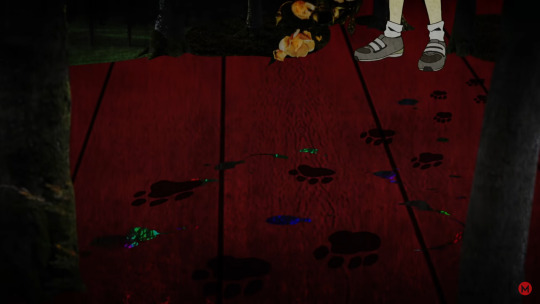
By the time he finds the dog, there is already blood, suggesting it was initally attacked by something else.
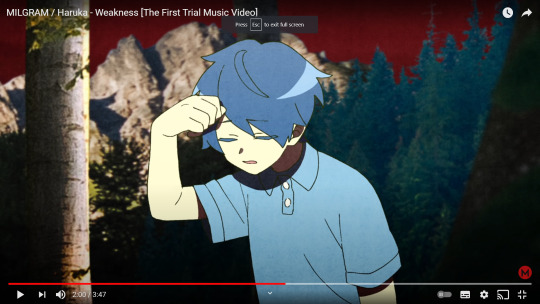
is this a sigh of relief from a boy whose finally found his beloved pet or a jealous weakling glad that nature took its course and he is finally free of that meddling mutt stealing all his mummy's attention? /j

I think this shock at the discovery that 'there is blood on his hands' could imply that rather than literally getting the blood from his dog, Haruka has seen his already injured dog and realises that if the dog got out because of him (he is previously shown to be aware his parents seem to blame him for everything) then he is the reason his dog is injured/dying and will be blamed for it.
(this scene plays over the lyrics
"It’s fine, though it’s really not It’s really fine, though I don’t really think so
When I tried to understand it,
You’ll make that disappointed face again"
suggesting he is trying to avoid making his parents disappointed and letting the family pet escape into danger is something that could make them very disappointed)
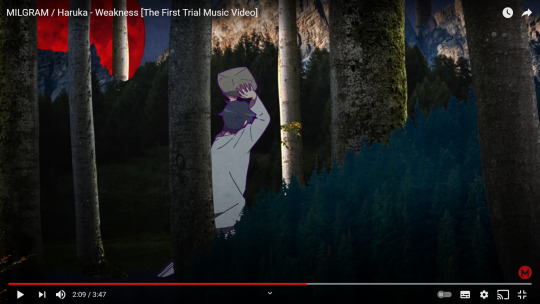
now we get into rock murder (this is present-day Haruka implying that this is either: not how the scene really played out; the writers really wanting the audience to know that this was Haruka's doing and not someone else's; or this turns into a separate incident that happened much later [although note that the red sky and blue moon is the same as when young Haruka first appears at the start])

b the corpse is beyond mangled now, but its clearly the dog because the silver chain collar is still there, to the right of the body.
(circled in red for your convenience :3)
My hypothesis is: Haruka didn't set out to kill his dog, but upon finding it injured (we don't know the severity aside from bleeding and also it not being able to run away from Haruka kneeling down above it w/ a big rock so it could range from treatable with a lot of vet help to already on death's door, TBH I don't think Haruka would know the difference)
He knew he'd be blamed for this; made into a villain who let the poor puppy come to harm. He panicked and killed the dog out of some idea that it would make him the victim here (since he'd be found crying over a dog corpse, which might make a parent go comfort him rather than getting angry about what could've happened to the dog).
This is over the lyrics:
"I cried, I screamed
I wanted to be a pitied and loved weakling
I was in denial, I was in denial I just had to make sure
I’ve become a victim, I’ve become a victim"
(there's another theory that he was also jealous of the dog, which could work here too, since this is not some calculated plot; rather its a rash decision)
This ties in with his Japanese song title (translated as Weakness) which is a play on a phrase sort of like "The strong eat, the weak do not" to become "The weak are eaten by society" or "The weak eat each other to survive"
[once again I am reminding everyone this is based on second hand information from the youtube comments section (from users mitchki and Alphaistic) because I do not speak Japanese]
This second meaning (The weak eat each other to survive) makes sense under the reading that Haruka killed his dog in order to 'survive' making his parents disappointed for the dog escaping.
Miscellaneous points:
We don't know where Haruka's necklace came from yet, it must be a gift since the most expensive thing he's ever bought was cotton candy. The younger child in the video isn't wearing it and neither is his mother or the girl in the purple dress.
Haruka's home seems quite big, at the start we can see a large flower garden outside the window and there's a forest in walking distance. This might suggest his family is quite wealthy

Haruka probably did go to school at some point as homeschooling is not a legally accepted as an alternative to public schools in Japan. (However it is estimated that up to 5000 families homeschool, this is uncommon)
A lot (about 62%) of Japanese schools apparently have a 'special needs' classes and there are about 505 schools focused on educating intellectually disabled students
(although I do not know which sort Haruka would've needed as whilst intellectual and development disabilities can be comorbid they aren't the same).
Now, if children aged 7-14 don't go to school, their parents receive a fine, but its possible that if Haruka's parents are wealthy, they just paid it to avoid sending him to school.
(This might imply they wanted to hide him or were generally ashamed of him in some way)
However high school education (for students over 14) is not legally required and its likely that even if Haruka went to elementary/middle school, he hasn't been around people his own age in at least 3 years. As he seems quite lonely and glad that the other prisoners give him attention.
I don't think Haruka's parents are divorced and if they are, its not his father who left.
Haruka mentions in the 30 questions that he thinks he disappointed his father. But still includes him as part of his family ("My father and mother and me").
A theory I've seen is that his father was disappointed by his son being disabled and left.
but developmental disabilities (especially in non verbal and semi verbal children like Haruka) can be diagnosed before the age of 3, so I feel it is unlikely that Haruka would bring up his father if he left that early in Haruka's life
All MILGRAM prisoners have covered one of DECO*27's older vocaloid songs (DECO*27 is a well known producer who composes the music for MILGRAM)
Haruka covered 'Two Breaths Walking' (https://youtu.be/puXLfVWrz2Q) which is about a boy's first relationship and how his mother's jealousy set him up for failure as the relationship becomes toxic
(specifically it has some very funny out of context lines like "Whose breasts are you sucking on now?")
so yeah, mommy issues: the song
(Also: some people say in the song, the boy kills the girl at the end, but this isn't literal, TBW is the first of a trilogy of songs about the same relationship, it is followed by Android girl then Two Breaths Walking: Reloaded and the story resolves with the couple reuniting as adults and getting in the relationship again, although its not necessarily as abusive as before, its still implied to be codependant ending on the line 'We should live like oxygen tanks, sucking breathe from the words each of us exhale, until our last breathe')
In all seriousness, the scene where younger Haruka is walking through the city with his mother but it keeps repeating until older Haruka pulls the younger one away might indicate an attempt to focus the happier memories of his parents (since this is also over the lyrics "Why is it breaking? Tell me why?
Please don’t change
If I tried and couldn’t say it,
You would get angry at me and say “You’re hopeless.”" which depict a worse scene)
I think both his parents are still physically present but have become far more emotionally distant, not giving him as much attention, which exacerbates his loneliness from not having any friends his own age to talk to
And if one of his parents did leave? I think its likely his mother since she is shown disappearing out of his reach after the dog-incident (inferring she got angry/disappointed in Haruka anyway)
This could also be where he got his necklace from: Its something his mother used to wear (although this is 100% a guess) and that's why its shown to be important to him
This one is just me, but i didn't realise until a rewatch that when Haruka is watching the younger him and the girl running together, the background has fireworks. Haruka mentions fireworks being a key memory to him so I wonder if this was one of the first/last times he got to make a friend...
On three separate occasions in the interrogation, Haruka mentions not liking animals. Despite this, he is depicted as sleeping with a rabbit plush and on his birthday art (I'd include that too but tumblr only allows 10 pictures per post, so here's a link) he is standing next to a giant blueberry and strawberry cake with two bunny themed biscuits at the side.
Through my experiences of seeing Japanese fandom art on pixiv, sometimes rabbits are used to insinuate a character is cute and timid in fanart.
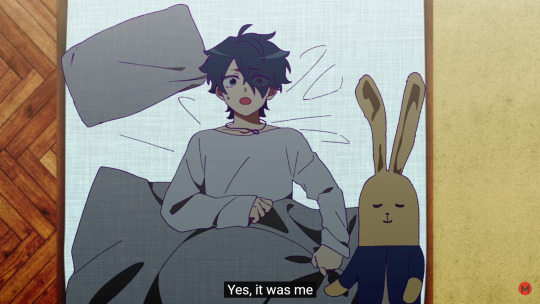
Meaningless details: Haruka sleeps with his necklace on; he sleeps on a bed and not a futon; at first I thought he woke up holding his plush's hand but his hand is merely next to the toy; and considering the state of the pillow and blanket, I wonder if he moves a lot in his sleep or if the is just because in this case he seems to be waking up from a nightmare about the dog incident...
Final note: I've spent so many hours writing this I don't remember if i was building up to any big finale or not but I hope you enjoyed reading this! Feel free to add on in the comments/reblogs.
69 notes
·
View notes
Note
Thank you for answering my question.
Regarding your reference to the Sapir Whorf hypothesis:
Do you subscribe to the idea that learning a foreign language, whatever that language may be, gives one a unique insight into how the L1 speakers of that language think and view the world? I feel somewhat uneasy agreeing with that. As in: Of course learning any language implies studying and learning about its original people's cultural norms, history and values, but isn't that something that can also be done independently from language learning?
What I'm trying to say is, I think the simple action of learning vocabulary, syntax, morphology and other rules of a language doesn't really help us see through the eyes of the people who speak it natively, and the parts of language learning that do help us do that, can also be done without learning the language (I.E. we can learn about the cultural referents and norms of the french or the chinese without actually studying french or mandarin or cantonese etc).
Regarding "Authenticity" and Prescriptivism:
My thoughts regarding the role of language preservation actually stem from an opposition to the notion of authenticity:
Isn't the notion that a people would/should learn a language to be able to better understand the viewpoints of their elders and ancestors something of a quest for "Authenticity"? Coming from a position of skepticism towards linguistic relativity, what i can't help but see in language restoration efforts is the pursuit of authenticity in the name of tradition, as in "A proper X-ese person should speak the X-ese language, because that's what their predecessors did".
I of course agree with the idea that people who don't live personally can only go so far as make hypotheses, but the reason for my doubts is that I see those parts of language preservation i'm skeptical of as something of a pidgeonholing mentality, an act of making people perform a time-consuming ritual of learning how to rapidly access vocabulary, syntax structures and schemata from their minds as sort of a performance of "proper belonging" to a people they already belong to.
Sorry for burdening you with this big long answer, you don't need my permission but feel free to ignore it
I do believe languages give unique insights into their native speakers. There is a "weak" version of the Sapir-Whorf hypothesis that language influences -- and is influenced by—a variety of both overt and covert biases enacted by the population of speakers. This 'linguistic relativism' has a great deal of evidence and is, as far as I have read, accepted by every linguist. This weak version opposes the "strong" version of the Sapir-Whorf hypothesis, linguistic determinism, where language DETERMINES thoughts/biases. Whorf's own evidence for this, shortly, kind of sucked.
But Whorf does have a point in that a language is in some ways its own experience. There is a distinctive quality to embodying that old perspective through speaking and hearing the heritage language, different from simply learning the facets of that perspective and the cultural-historical context it appear[s/ed] in. One can know a certain person founded an ethnic group, or that past people performed a specific ritual certain way at a certain time due to certain concerns, or even how to perform that ritual. This is different from participating in language. By speaking and listening one must interact with those views in mind, and one only gains this knowledge through performance. Participating in tradition is the goal here, rather than knowing of tradition.
Whether experiential and factual knowledge are equally valuable is an old and never-will-be-settled debate. But I do think language revitalization projects help participants see through the eyes of people who speak/spoke it by re-enacting (even reifying) the mode through which those biases are conveyed. I think the factual aspect of learning is a major facet of achieving a wholesome understanding of any worldview, but I'm trying to deny your claim and emphasize the fact that language is inexorable from that understanding.
I think it is both pigeonholing and reductive to group all revitalization projects as "getting proper X-ese people to speak proper X-ese, because that's what their predecessors did". Let's get an example, The Cherokee Revitalization Project:
"The results of the 2002 research survey funded by the United States Department of Health & Human Services Administration for Native Americans [found while] in 2000 there were an estimated 10,000 speakers of the Cherokee language in the state of Oklahoma, by 2002 the survey found no fluent speakers under the age of 40. Based on research of endangered languages, the Cherokee Nation estimated that the language would die out in one to two generations. The survey found, as one possible cause, that many elders resist speaking to their children and grandchildren in Cherokee in the belief that it will help them avoid the negative experiences of their own generation. Based on the results of the study, Principle Chief Smith declared a state of emergency and preservation of the Cherokee language became a top priority for the Cherokee Nation. Organizing a task force comprised of elders, educators and concerned citizens, the Cherokee Nation Language Department formulated a comprehensive language plan to preserve, protect and promote the Cherokee language."
Here we see a language on the verge of death that has "proper" speakers capable of teaching the language in what I imagine would be an "authentic" way. The implicit argument for language revitalization here is that the language deserves to live and the people most connected to it want it to continue to live. It is a different perspective from "an act of making people perform a time-consuming ritual [...] as sort of a performance of 'proper belonging' to a people they already belong to." Which, if true anyway, what's the problem with affirming ones identity of belonging with a "time-consuming ritual"? Is it because the idea that governs what counts as a ritual of affirming a given identity—tradition, perhaps—is in some way unethical?
I think your skepticism about "language restoration efforts [in the name of tradition]" is skepticism about tradition as a whole. That's why I said you're more concerned with "how we as humans relate ourselves to the past". But to be honest I'm also not exactly sure of your wording since you said you are "coming from a position of skepticism towards linguistic relativity" and then say this supposed enforcement of authenticity is a pidgeon-holing mentality, so I'm just going to assume you mean you ARE a proponent of such relativity (against which the truth claims of authenticity is opposed). I can't really converse confidently about whether tradition is, at large, a concept we as humans should have, and what to do about that if we shouldn't. I read a paper for this ask (here) about the question of authenticity in anthropology and its an entertaining and thoughtful read. It relates the concept of authenticity to whether there is a subjective or objective truth, or something in the middle, the relation which makes sense: Authenticity is the deciding the "realness" of a given idea or practice and culture is to some degree the enforcement and reinforcement of that authenticity. To me this authenticity or realness is obviously culturally relative and thus the meaning or realness of a given authenticity can't be decided by someone outside that experience.
But returning to the main topic, learning the rules and parts of a language is, again, equivalent to learning facts. That's not what language revitalization is here for, and not what the participants and organizers want. They want to experience the language firsthand as it is performed and to mingle with that world of experience. This cannot be done simply with learning historical facts and theoretical processes. How they are allowed to prune the tree of authentic experience I don't really have the authority to comment on.
80 notes
·
View notes
Note
https://m.youtube.com/watch?v=GUpZxEXnvAc
again jikook acting strange to each other. I don't know, but I feel that something is happening between them. I can start thinking about the hypothesis of this being the real jikook ... jimin doesn’t give a damn to jk, it just feeds an old story from the past because the fans like it: a jimin who loves jk unconditionally and is always looking for his love. or maybe they are just in another fight, I don't know ... I wanted to fully understand what has happened between them ... analyzing these two last leaked videos and other moments out of bh's camera, jk looks like the one who runs after jimin in real life, but why on camera does jimin act to look the opposite?
I-
You know what? Don't let JK hear you say things like that. Lmho. His pan is lethal.

Don't say I didn't warn ya. Lol

Is something actually happening between them or do you FEEL there is something happening between them?🤔
The link you shared doesn't work. I tried manual search too but the video itself is not available. Thus, I can't comment on it unfortunately. Is it the recent video of them rehearsing for AMA? DM me with it if you can.
Also what other BH moment are you referring to?
Anywho, in regards to that whole Jikook don't interact behind cameras theory, Jimin doesn't care about JK when the cameras go off, Jikook is fanservice and other variants of these theories peddled by nonshippers and shippers of Jikook alike, I think I've made my stance unequivocally clear- I don't share that view.
I am well aware of Jikook's interactions behind the cameras. Seen enough leaked footages and saesang-esque prints throughout the years to know these kinds of assumptions are just that- assumptions.
I get called a whole lot of names, by both Tuktukkers and some Jikookers- and as a good samaritan just pointed out to me, 'my views on Jikook are very controversial' but I am an Alt- shipper not a con shipper and even though our views may align sometimes on certain things, most times we are going to hold divergent views simply because we are viewing them through different lenses.
It doesn't mean my perspective is superior and theirs is inferior or vice versa. It doesn't mean my views are valid and theirs is not or vice versa. They are just different views. Different schools of thoughts. Neither is right or wrong or fact, OR FACT- this is the shipping industry, we are all delusional until Jikook come out as LGBTQ plus couples.
And I think if I've been peddling anything so far, it's that Jikook are human, they don't kumbaya all the time- on or off cameras. They aren't holding hands walking into the sunset, harmonizing to a Marvin Gaye song while flipping one for Jesus.
There are lots of ups and downs with those two, petty fights, serious fights, breakups, make ups, a lot of pouting when JK has gone on longer without sex- that's when he starts growling at anyone who as much as breaths near Jimin, and when Jimin throws it back for him that's when he too starts crying when JK touches another member's neck, bless them- it's a vicious cycle, those two. Lol There's a lot of work related stress, bad hair days, I hate mondays and an excessive amount of anomalies in their day to day interactions on or off cameras that is all so quintessentially human things of them to do, from my perspective.
So whatever you are feeling could just be them being real and human? Chilee, I don't know. Lol
The way that I ship them, I try to reconstruct their interactions based on things that go on around them, their interactions with their bandmates- sometimes the tension between Jikook is just because JM is fighting with V not JK, or JK with- well all of them. Lol
Their mood could also be as a result of their tensions with their company, manager, stylist Noona- getting overworked, overwhelmed by tasks, disapproving of certain content they are made to film etc.
I take into consideration all these things, their company's marketing strategy, the political climate in SK, social events in SK, protests, controversies surrounding them, and basically anything that I feel can impact and influence their moods in a given moment in any way so I can make sense of certain moments when they do happen involving them- doesn't mean the conclusions I draw are facts. Hell I get it wrong sometimes. Lol
So when you say, you analyzed those videos I hope you tried to draw on context? I hope you took into account other things that could have induced those moods you were seeing? I hope you took into consideration their past behaviors, certain patterns of behavior in their interactions and not just based your opinion on your feelings?
I really would like to see the moments, you are referring to but as I've said, I believe that of the photoshoot was a manifestation of a lovers squabble between them- don't know about the rest.
Friends fight, relatives fight, lovers fight. Hell, Vmin, Yoonmin, Taekook and all these other pairs fight too and they admit it. We've seen Taejin go at it, Taegi and the whole hand holding each time they disagree saga- It's one of the things that set BTS apart from other Kpop bands who peddle the Kumbaya narrative and throw dust in their fans' eyes only to reveal years later how much a certain bandmate hated and abused them to the point it drove them to attempt to take their own lives.
And I'm glad you don't seem to hold on to that Jikook kumbaya narrative. You seem open minded, I can work with that. Lol.
When JK talked about the rain fight, JM asked 'which one' so clearly there's been more than one fight and we've seen a few of those with our own eyes cough cough. So yea, you could be right about the mood being a fight. I guess. Haven't seen it so again, I don't have an opinion there.
Also, bare in mind as I keep pointing out, Bighit does not feed us content in real time and most of the moments we see tend to be very anachronistic and can lose its context if you are not keeping an eye on the timeline.
I really don't know the thought process that goes into these other theories you've mentioned and so I can't give any constructive feedback on those. But I try to share my thought process as much as I can.
And I'm glad you at least believe JK 'runs' after JM in real life because that whole JK hates JM narrative takes a few lives off of my chest. Lol
With JM, well I keep saying the person we see on our screens is mostly a persona. And I did say in a past post that that whole 'boy unconditionally in love with JK' is a facade. From my point of view at least. But that doesn't mean he is not in love with JK. He really is. HE IS- he just doesn't show it in the way we think he does with JK. In my opinion.
Jimin's persona is a topic I can't wait to further discuss and get into- will be doing that soon. I hope we can have this conversation after my post so we compare notes and share ideas? I would really love that.
I hope this helps and thanks for the Ask. Namaste.
Signed,
GOLDY
48 notes
·
View notes
Text
ok @the-defiant-pupil i'm just gonna go ahead and make a new post bc this is about to get too long for my adhd ass
(context: continuation of this post)
1. funny thing is, i've actually read most of your sources already. they get really, really boring after awhile though, bc all of them start to say the same thing: yes there are differences, but there are also similarities, and scientists have yet to figure out the significance of this.
i'm not gonna go through each and every one of your sources, and i shouldn't be expected to either. when it comes to biological research, find the most recent articles with the most solid evidence/conclusions and call it good. don't dredge up an entire archive. i could find you sources that only characterize lichens as 2 symbiotic organisms rather than 3, but that wouldn't be correct bc the most recent research says otherwise. so yeah, just bc you CAN find that much info out there doesn't mean all of it is viable and should be used.
also, you can't just list a bunch of sources and expect it to be enough. you should contextualize them, explain them, tell your audience why each one matters. if you're really going to have that many, then be prepared to give a short annotation for each one bc i can guarantee you no one has enough time on their hands (or in my case, attention span) to read that many sources
your "plain as day" source by the way?? says this as well:
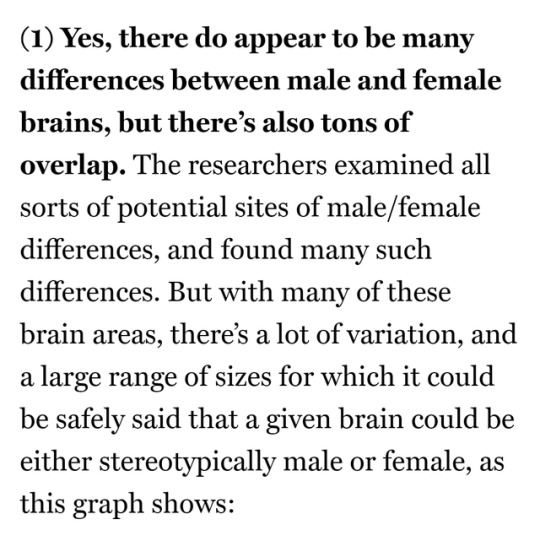
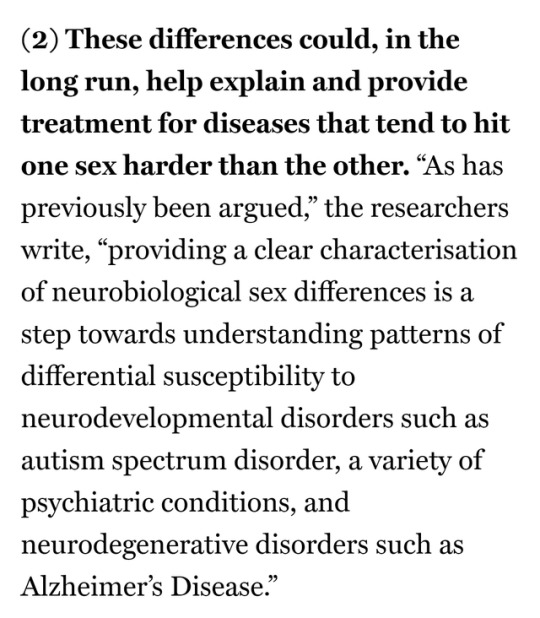
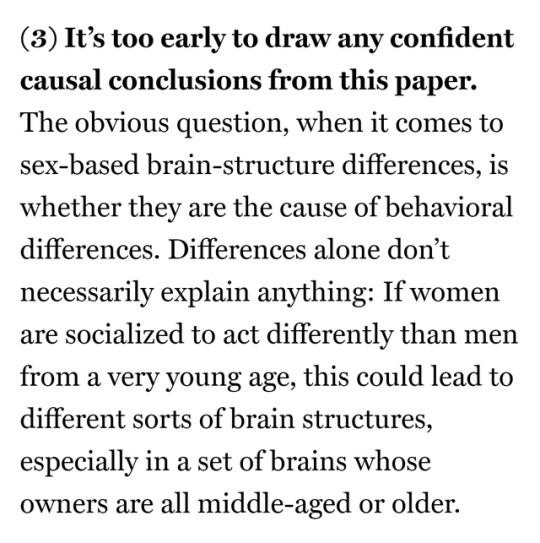
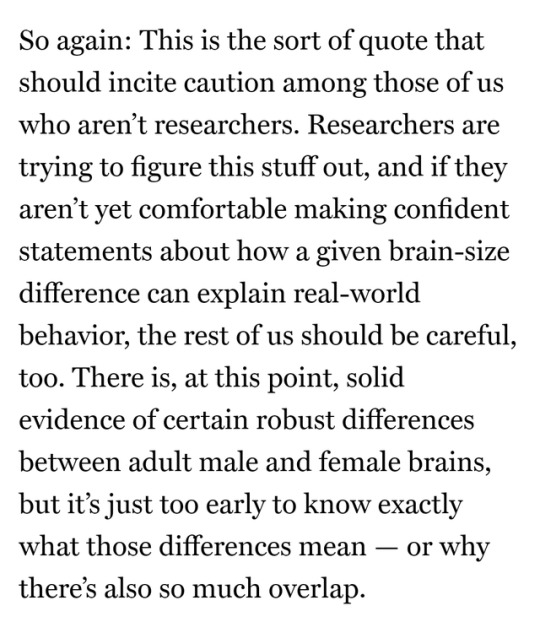
this is what i was talking about earlier!! do you actually read, contextualize, and analyze what you read? or do you just find the first line you agree with and run with it?
bc what i got from reading that article is that even after years of research and the largest study to date, scientists STILL don't fully understand what they're looking at, and they might never. so we, as people Not Actively Researching This Subject should be incredibly hesitant to draw our own conclusions when even the researchers can't do so.
i also like that the author mentions how socialization can affect brain structure and development — did you know that domestication causes visible differences in gene structure between the ancestor and current-day species? bc of selective breeding, humans changed the genetics of dogs, cows, crops, etc.; genetics changed bc of domestication, domestication didn't come about bc of a change in genetics. and i KNOW that you're going to tell me this has nothing to do w what we're talking about, but it does hold a similar concept: it's not just genetics and bodily functions that affect behavior, the environment has an equally important role.
similarly, gene expression in almost every species is highly regulated by the environment just as equally as it is the body (and for clarification: environment means anything external, body means anything internal). as are hormonal responses, reflexes, emotions, etc. all of which can have subtle but lasting impacts on the body! i don't actually think that anti-transmeds are trying to deny science when we say that how your brain developed is not the only thing that affects gender identity! i think it's kinda actually the opposite!
2. i've haven't heard of this tumblr biologist, so please direct me to their publications, i'd actually really love to read them
3. science literacy is a whole other beast than literacy in general. like, yes, you have to be able to read, but suddenly specific word choice and HOW you read articles becomes important. it goes from reading chronologically (english literacy) to reading section by section and contextualizing what you've read in previous sections and articles so that by the end you understand the initial hypothesis, if the evidence ACTUALLY proved it, if their methods were sound, and why it matters in the particular field.
i'm not trying to say that people who aren't studying science can't read peer-reviewed articles and understand them, but you do have to realize that it's a completely new skillset you have to practice over and over again, not just something you can pick up on the fly
4. i think you completely missed my point about the anti-vaxxer movement. the reason it started was bc McBastard Wakefield published his article and before any other research could be done to refute it or back it up, the greater population picked it up and ran with it. 7 or so years since it's been debunked and he lost his medical license, but people still believe him bc he got published, and to some of the most accredited journals at that.
my point was that just bc the research exists doesn't mean we should accept it at face value until the medical/scientific community can undeniably say "this is what this is, and what it means." and they're STILL doing further research, which means that hasn't happened yet. bc the whole point of science, and by extension research, is to never be satisfied w your results, and instead continue to look for more than you can currently see. or at least that's what i've been taught.
bc to look at published articles and assume that they MUST be true bc it's PUBLISHED SCIENCE is...exactly what the anti-vaxxer movement began on. and i'd rather not repeat that.
(please show me, by the way, how """tucutes""" 1. actually exist and 2. harm anyone by simply living their own damn lives)
5. yeah """""tucutes""""" don't have any science bc uh.....there really is none. science is a process, and we're currently in the research phase which means NO ONE should be using it as proof. it's good to say "hey this exists" but to completely invalidate someone's existence based on studies that scientists are still trying to understand? that's called abusing and misconstruing results
6. i'm guessing you don't actually care, but sure. i'll explain mating types of fungi to you.
in short: genetic diversity is advantageous for survival, and fungi are nothing if not crafty little bastards, thus 1000s of mating pairs for better chances of sexual compatibility
in long: each mating type is determined by a set of genes. really, you can think of mating types as extended alleles, since each distinct allele has a distinct mating type.
so as for 5 different mating types and how they're different...there you go. that'd be like asking me to tell you 5 different alleles of the same gene and how they're different. the only difference is in sequence and then how they're expressed due to differences in sequence.
usually we don't categorize every single mating type since that'd be a bit...much.
however, we can and do categorize fungi by how they reproduce! i.e., what kind of syntamy do they display? can they go through diploid selfing? can they inbreed or only out cross? what's their primary stage of life: diploid or haploid? do they rely on sexual reproduction or asexual reproduction? if it's an ascomycete, do they form pericarps or ascocarps?
in fact, one of the main differentiators between fungi is their life cycle, most of which is geared towards reproduction. that's why although basidiomycetes and ascomycetes are the only fungi that can form macro fruiting bodies (as well as many, many other similarities), they'll always be categorized differently.
but i digress. the reason i compared fungal mating types to brain morphology and "sex" categorization is bc i was making an analogy. i'm not a neurologist, as you can probably tell at this point, but that doesn't mean i haven't taken any classes that covered the brain pretty extensively.
what i was really trying to say was this: everything that i've read so far says that although there's definitely some differences between brains, there's also a significant amount of overlap, so much so that when you try to categorize the brain into two distinct types, you're still going to have an incredible amount of variety.
likewise, you could, theoretically, do the same to fungi. you could sequence the genes from each mating type, determine the different SNPs, and categorize them into two distinct groups based on what SNPs they do/don't have. it wouldn't make sense to do so, though, bc there'd still be too much variety within each group.
this was just me trying to relate it to what i personally study but tbh i can see how that would've been confusing, so i apologize for that
2 notes
·
View notes
Text
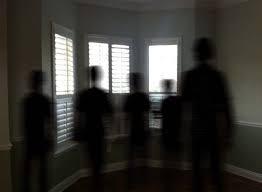
Shadow People
They usually come at night. Maybe you're reading or watching TV or just lying in bed. He's most often a man, and may be wearing a hat or a hood. A lot of times you'll only catch a glimpse of him out of the corner of your eye, as he flits across the wall or disappears through a doorway. Sometimes he's just a shadow, a flat projection sliding across the wall or ceiling; but other times, especially in the dark when you least expect it, shadow people appear as a full-bodied black apparition, jet black like a void in the darkness itself, featureless but for their piercing empty eyes.
The foggy Santa Lucia Mountains run along the central coast of California, and for hundreds of years, the Chumash Indians and later residents have told of the Dark Watchers, shadowy hatted, caped figures who appear on ridges at twilight, only to fade away before your very eyes. A visit to the Internet reveals hundreds and hundreds of stories from people who saw shadow people in their homes, on websites such as shadowpeople.org, from-the-shadows.blogspot.com, and ghostweb.com:
I opened my eyes and looked towards the middle of the room. I saw a large shadow in the shape of a person. It had no facial features that I could see and it wasn't moving. It was just standing there looking at me... I blinked and then it was gone.
I felt like someone was watching me so I turned to look toward the hallway and there it was in the doorway... It was a black figure. I could only see from the torso up. I felt it was a male and could feel that it was looking at me... I started to walk towards it and it disappeared back into the room.
There, at the foot of my bed, was a tall dark figure like a shadow. It appeared to be almost 7 feet tall with broad shoulders and was wearing what seemed to be an old fashioned top hat and some sort of cape... I watched as it glided past me and out the door of my room.
Correction: Further research suggests that the Chumash did not necessarily have any legend that reasonably corresponds to the Dark Watchers, and thus this link is probably the invention of 20th century ghost story tellers. - BD
It goes without saying that skeptics have long-standing explanations that, from the comfort of your armchair, adequately rationalize all the stories of shadow people. These explanations run the gamut, all the way from mistaken identification of a real shadow from an actual person or object, to various causes of optical illusions or hallucinations like drugs or hypnogogic sleeping states, even simply lying and making up the story. I think that probably everyone would agree that these have all happened, and therefore they do explain some people's experiences. But here's a fact: Try to offer any of those explanations to someone telling you about a specific sighting, and it will likely be immediately shot down. "I was not asleep." "I know the difference between a regular shadow and what I saw." "What about my friend who saw it with me?"
The truth is that it's probably not possible to explain most sightings. If it was some mysterious supernatural noncorporeal being who flitted through the room, no evidence would remain, and thus there's nothing to test or study. It's so trivial to fake photos or video of something as vague as a shadow person that when these exist, they're interesting but practically worthless as far as empiricism goes. Only in the rare case where an actual physical cause can be found, and you're able to consistently reproduce the effect at the right location and the right time of day and in the right lighting conditions, are you able to provide a convincing explanation. Most of the rest of the time, all you have is conjecture and hypothesis, and the eyewitness is likely to reject these.
When I was a kid we once lived in a house where if you walked up the stairs and one of the upstairs bedroom doors was open a crack, you might see a flash of movement inside the room from the corner of your eye. I saw it a number of times, and other people in my family did too. I thought it looked like someone threw a colored sweatshirt across the room. But: I never saw it whenever I walked carefully up the stairs and kept my eyes on that crack; it only happened if you weren't looking right at it and weren't thinking about it. The more you learn about how the brain fills in data in your peripheral vision and blind spots, the less unexpected and strange this particular experience becomes. I have no useful evidence that anything unusual happened, and I have good information that can adequately explain what was perceived. I personally am not impressed enough to deem it worthy of further investigation, but others might be, and that's a supportable perspective. But unless and until some substantial discovery is made, the determination that it must have been a shadow person or ghost is ridiculous. Nothing supports that conclusion. And yet my story is at least as reliable as 99% of the shadow people stories out there. I was not on drugs, I know the difference between a shadow and what I saw, and other people saw it too.
Enthusiasts of the paranormal offer their own set of additional hypotheses about shadow people. One proposes that shadow people are the embodiments of actual people who are elsewhere but engaged in astral projection. This is not an acceptable hypothesis. Like shadow people themselves, astral projection is an untestable, undetectable, unprovable conjecture. Explaining one unknown with another unknown doesn't explain anything, and the match itself cannot be made, since neither phenomenon has any known properties that you could look at and say "What we know of shadow people is consistent with what we know of astral projection." We know nothing about either, so there's no logical basis for any connection.
The same can be said of another paranormal explanation for shadow people, that they are "interdimensional beings". Let's make an outrageous leap of logic and allow for the possibility that interdimensional beings exist. What characteristics would they have? How would we detect their presence? What level of interaction would they have? How would they affect visible light? Since these questions don't have answers, you can't correlate interdimensional beings to the known properties of shadow people. Neither one has any.
But there are phenomena to which we can correlate these stories. We know the details in the eyewitness accounts, and we know the psychological manifestations of conditions like hypnogogia and sleep paralysis. A hypnogogic hallucination is a vivid, lucid hallucination you experience while you're still falling asleep. You're susceptible again eight hours later when you're waking up, only now it's called hypnopompia. But this seems such a cynical, closed-minded reaction. When you suggest hypnogogia as a possible explanation to a person who has witnessed shadow people, many times their reaction will be understandably negative, if not outright hostile. "You're saying I'm crazy" or "You're saying I imagined it" are common replies. Hypnogogia is neither a mental illness nor imagination, and to dismiss it as either is to underestimate the incredible power of your own healthy brain. Too many people don't give their brains enough credit.
I had a dramatic demonstration of the power of hypnopompia — the waking up version — when I was about 10 years old. Early one morning, the characters from Sesame Street put on a show for me in the tree outside my bedroom window. It had music, theme songs, lighting cues and costume changes: A full elaborate production, and it lasted a good hour. To this day, I have clear memories of some of the acts. I even went and woke my parents to get them to watch, but by then the show had gone away. I knew for a fact that I hadn't been asleep. I'd been sitting up in bed and writing down some of the songs they sang. Those writings were real, on real paper, and even made sense when viewed in the light of day. It had been a completely lucid, physical experience for me. But it only existed inside my own brain in a hypnopompic state. My brain had composed music, performed the music, written lyrics, and sang them in silly voices for some director who must also have come from within me. The skits were good. The actors were rough-sewn muppets, independently moving and climbing about, even swinging through the swashbuckling number, on tree branches representing the lines of a great pirate ship. Yet through it all, I'd been conscious and upright enough to actively transcribe the lyrics. That's the power of a brain.
But many believers reject the idea that their brain has such capabilities, and instead conclude that any such perceptions can only be explained as visitations from supernatural entities. One such believer, Heidi Hollis, has gone on Coast to Coast AM radio a number of times with suggestions to defend yourself from shadow people:
Learn to let go of your fear.Stand your ground and deny them access to your person.Focus on positive thoughts.Use the name of Jesus to repel them.Keep a light on or envision light surrounding you.Bless your room with bottled spring water.
Interestingly enough, such actions may actually work (although it's not the techniques themselves that are responsible — plucking a chicken or beating a drum could work just as well, if you think it will). Sleep disorders in the form of disruptive episodes such as these are called parasomnias, and the primary treatments for parasomnias are relaxation techniques, counseling, proper exercise, and the basic lifestyle changes that contribute to better sleeping habits. True believers who reject any notion suggesting their experience was anything but a genuine visit from a supernatural being, but who apply any such remedies as Hollis suggests, do indeed have a good chance of finding relief, when the process of applying the remedy brings them some peace of mind. Even though these remedies are rarely going to be as effective as professionally guided treatment, the fact that they can sometimes work only reinforces the true believers' notion that the shadow person was in fact an interdimensional demon, and that sprinkling holy water around the room did in fact scare it away.
These experiences are weird, and can be scary. But they're also fascinating, once-in-a-lifetime opportunities to experience the true power of your brain. To conclude that it's a supernatural being is to rob yourself of the real wonder of what's probably happening. Fa
6 notes
·
View notes
Note
what does alan watts say about the evil in the world ? and how to... stop getting so bogged down with it. i don't think Leibniz's concept of optimism is the answer so i was wondering what he has to say on the matter, if he does. thank.
All emboldened words are direct quotes from Alan Watts’ texts and/or lectures (with the exception of one short phrase by Carl Jung). All remaining text is mine.
Gosh, this is a question with a set of inexhaustible answers. I really appreciate you asking it but I apologise in advance for what will be a lengthy response.
Alan Watts’ most concise response would have been that “All opposition has its resolution in an underlying unity.” If you’d like to stop here and take away one generalised message that can be applied to all aspects of life just as much as it can to the concept of evil itself, let it be that. If not, buckle in!
So, what does Watts mean by that? Central to many of his lectures was an attempt to demonstrate the limitations of polarity. Humans (particularly those raised with a Western mindset) have a tendency to view the universe as a complex amalgamation of mutually exclusive concepts that exist in constant opposition to each other. What Watts sought to reveal was that such polarised thinking failed to acknowledge the underlying unity of all things. He fervently rejected the “Disastrous and absurd hypothesis that there is an absolute and radical conflict between good and evil (or light and darkness) that can never be harmonised.”
Within this already too long response, I couldn’t easily summarise the wide array of concepts and ideas with which Watts harmonised good and evil. That said, I’ll still give it a try.
All things are dependent upon all other things for their existence. In the specific case of good and evil, a person could not recognise either without having knowledge of the other. Furthermore, these seemingly opposed concepts arise from each other in a mutual way. “If you’re going to have black, you won’t know that it’s black unless you have some white. And if you’re going to have white, you won’t know that it’s white unless you have some black.” Following this idea of a mutually dependent recognition, Watts proposed that “It is evil which makes possible the recognition of virtue.”
You’ve indicated that you don’t wish to get so “bogged down” in the fact that evil exists in this world. I’m not deeply familiar with Leibniz’s concept of optimism but I assume that it feels unsatisfactory to you insofar as it requires you to have blind faith in God’s judicious choice between all possible worlds—a choice from which our world emerged as the best and most good. In other words, it might feel unsatisfactory to the extent that it fails to deeply restructure your emotional and intellectual relationship with evil (and the inescapable fact of its existence). Instead, it only invites you to tolerate things as they are by accepting that they aren’t much worse. What, then, are we to do with our negative emotional reactions to the existence of evil in this world?
“Our rage against evil things which occur in this world must not overstep itself. [Because] if we require as a justification for our rage a fundamental and metaphysical division between good and evil, we [create] an insane and schizophrenic universe of which no sense whatsoever can be made.” Some of the sense to which Watts is referring here is the aforementioned idea of being able to recognise virtue by its comparison to evil. Allow me to reference a different lecture in which Watts was once asked by a member of his audience how he would ameliorate evil in the world if he were God. In the spirit of that lecture, Watts responded as if he were actually God himself. His answer was thus:
“I begin with the point that I [as God] am responsible for the way the world is. If I couldn’t feel that, I would have to blame somebody else. I’m not willing to do that because I know that under various changing circumstances, it might be appropriate for me to be as a big a rascal as rascals have been […] As for improving the world, the world is always improving. It may look to some people slow but it’s improving even when it is declining. The world works in an undulatory process, like a wave. It goes up and it goes down. It goes up and it goes down. It couldn’t go up all the time because if it did we wouldn’t know that that was up. So it goes down some of the time so that we can know when it goes up.”
Now, before you personally lump Watts with Leibniz into that group of philosophers with unsatisfactory solutions to the problem of evil, I will add that Watts himself said that these ideas were “NOT a philosophy of condoning evil.” Instead, Watts is inviting each of us to conceptualise evil as something that must fundamentally exist if the concept of good can also do the same. He is not proposing that we should be passive or calmly tolerant of evil—maybe even quite the opposite. While discussing Adolf Eichmann (one of the most infamous organisers of the Holocaust) Watts acknowledged that he himself would have experienced a tremendously negative emotional reaction should they have met:
“Human emotions are deeply and rightly aroused. I would say that if I were in any situation where an Eichmann was operating, I would be roused to a degree of fury that I can hardly imagine in my present existence. I would oppose those sorts of villains with all the energy that I have. But, at the same time, I would recognise the relativity of my own emotional involvement. I would not be able to regard my adversary as a metaphysical devil—as one who represented the principle of absolute and unresolvable evil.”
Here again we return to the proposition that “All opposition has its resolution in an underlying unity.” The difference here, however, is that Alan Watts is now asking us to recognise that unity in our own psychological selves. Here he is proposing that we each have an “element of irreducible rascality in us.” The following block quote expounds upon this idea of rascality being present in each of us. You are likely to disagree with it but the conclusion that Watts is asking us to draw from it isn’t immediately obvious. Watts is inviting us to recognise a simple idea proposed by a man whom he deeply respected and admired: “Condemnation does not lead to liberation.”–Carl Jung
“To the degree that you condemn and find evil in others, you are to that degree unconscious of the same thing in yourself. Or at least of the potentiality of it. There can be Eichmanns and Hitlers and Himmlers just because there are people who are unconscious of their own dark sides. [These people] project that darkness outward into Jews or Communists or whatever the enemy may be and say ‘There is the darkness; it is not in me. And therefore because the darkness is not in me, I am justified in annihilating this enemy!’”
If one stands any hope of not being “bogged down” by evil and its existence in the world, one needn’t condemn it in others nor in oneself. Instead, one should conceptualise good and evil not as exclusive opposites but rather as universal concepts that are mutually interdependent. You can’t have one without the other. More to the point, you needn’t try to abolish one so that the other may prevail; that is an impossibility. Rather, by dissolving the illusory opposition and revealing an underlying unity, one is likely to develop a broader perspective from which evil isn’t to be abhorred and vilified on a metaphysical level.
I could go on and on but I’ll stop here. I’ve done my best to clarify Watts’ position (as I understand it thus far). I’m still learning. I hope I’ve helped even a little. Thanks for your question! If I haven’t explained something here coherently enough then please let me know.
83 notes
·
View notes